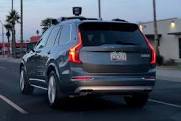 In a taxi in DC – the driver wends his way around buses and pedestrians. It’s the day after the self-driving car killed a pedestrian. The next day, you can find scores of link references to a police comment that the car was likely not at fault though no investigation has completed – or even been started. In another tech publication (“Big Think – your daily microdose of genius”), you can read that in over 1.5 million miles of testing, one year ago was the first time the car had been at fault when it crashed with a bus. Really? How does the writer know this? Because Google says it was a ‘misunderstanding in the car’s software and from now on, the car will understand that large vehicles and buses will be less likely to yield.’
In a taxi in DC – the driver wends his way around buses and pedestrians. It’s the day after the self-driving car killed a pedestrian. The next day, you can find scores of link references to a police comment that the car was likely not at fault though no investigation has completed – or even been started. In another tech publication (“Big Think – your daily microdose of genius”), you can read that in over 1.5 million miles of testing, one year ago was the first time the car had been at fault when it crashed with a bus. Really? How does the writer know this? Because Google says it was a ‘misunderstanding in the car’s software and from now on, the car will understand that large vehicles and buses will be less likely to yield.’
What problems are self-driving cars supposed to address? Meanwhile over in Congress and ‘government oversight’, self-driving car regulations were loosened in July, enabling federal safety regulations to override those of states. Why? Because ‘boosting the industry is vital to car safety.’ And why is that? Because of the volume of motor vehicle accidents and fatalities. So let’s understand this in a data context – there were 268 million vehicles registered in the US as of 2016. Cars are kept for 11.6 years. Older drivers like to drive their cars, despite the oft-repeated justification for self-driving cars is to ferry older people around. Lobbying for looser regulations has reached a new and quite convivial pitch – note the fun formation of a ‘supergroup’ of car company and tech lobbyists, supported by the mantra of reduced accidents and greater safety. Traffic deaths are a 'public health crisis that cannot be tolerated.' But consider (40,000) traffic deaths (texting, distracted driving, no seat belts) as compared to the number of cars (268 million) in the US. Now imagine thousands or millions of self-driving cars, all dependent on software trained to understand and anticipate obstacles of every conceivable type, never mind road conditions, weather, or pedestrians moving outside of the crosswalk.
Meanwhile the taxi driver is afraid that his job will be eliminated. He does not see why his livelihood, which is already in jeopardy from Uber, should be further jeopardized because Googled upstarts say they can make it so. Uber drivers are unhappy about their pay, but see how the company disputes an MIT study of how low the pay really is – the author back-pedaled, sheepishly admitting that many have 'other jobs.' Well, that takes care of that, right? And of course, ride sharing services like Uber and Lyft reduce traffic in big cities, right? Not exactly – see data from New York. The consumer has loved the convenience of Uber and its app – which is where this all started -- so too will self-driving hype fit into the media-ready recipe of convenience (no need to own a car!), sprinkled with media-fueled repetition about bad human drivers and accidents. By the way, does media hype exist if the press was not briefed by firms? Just asking.
In the click-bait of technology myth-making, what about those eliminated drivers? Are they re-trained for other industries? Do they transition into home care, home health care, or senior living, which can’t find enough workers? Not a chance. When trucks are self-driving, where do those drivers go? Into health care? Who really thinks big about the impact of automation on a workforce or online purchasing on a retail economy? Of course we all love tech-enabled progress. Think Facebook, after all. But will the click-driven media occasionally observe that what may look like progress is a nightmare – and not just around the corner, but on the streets and sidewalks where you live.

 In a taxi in DC – the driver wends his way around buses and pedestrians. It’s the day after the
In a taxi in DC – the driver wends his way around buses and pedestrians. It’s the day after the
Comments
And the Wall Street Journal columnist Mims says it best
https://www.wsj.com/articles/driverless-hype-collides-with-merciless-reality-1536831005?mod=searchresults&page=1&pos=1